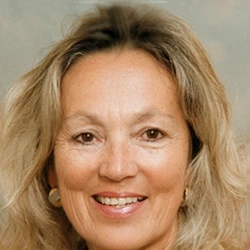Sandy Finestone is a new monthly contributor to YSC’s blog and a RISE advocate, an exclusive group within YSC ’s volunteer structure that represents YSC at external conferences, contributes to scientific discussions and participates on review boards for research. She is also the co-author of 100 Questions and Answers about Intimacy and Sexuality after a Breast Cancer Diagnosis.
It is very, very, difficult to feel sexy when you are bald, nauseous and one or two of your breasts have been removed. Sure, it’s great to have a partner who still wants to be intimate with you. But it’s not so great if you have no desire at all and when you have attempted to have sex it has hurt.
I struggled with all of the above when I was first diagnosed with breast cancer at age 41. It took a long time and lots of tears before my husband and I were able to work things out.
Sex Before Cancer: My Story
Prior to my diagnosis, our sex life was pretty much directed by my husband. I was a passive but willing participant, and he expected nothing to change after my diagnosis and surgery. I had a double mastectomy and did not have reconstruction for a year.
Raised in a very conservative household, I even got changed in the closet. He would always try to peek in, which was great fun and made me feel good about myself and my body. After my surgery, he stopped peeking. I was crushed. I felt like damaged goods. When I pushed and pushed him to tell me why he’d stopped this playful habit, his answer was painful.
He said, “Scars don’t turn me on.”
Those words took my breath away and took all the caring out of our marriage. It took a lot of counseling, a lot more tears and a lot of honest discussion and hard work before we got back on track. But we got there, and you can too.
Get Excited About Intimacy After Breast Cancer
The first thing I would mention is that being intimate and or having sex does not always have to mean penetration. Your body has undergone some changes after breast cancer treatment. You and your partner may need to do a lot of exploring to find out what pleasures you now. It may be different than it was before surgery and treatment, but it does not mean that it can’t be exciting.
Think of it as a trip to a new country, one where you have to do a lot of walking rather than taking trains, planes or automobiles. A trip where you have to give your partner a hand to get to the next castle or mountain or hillside. Pretend you are in a country where the custom is to allow intimate touching but no penetration. I am sure some of you might cheat but no one will tell on you. Take turns touching, tell each other what you like and what you do not like. Guide your partner's hand and any other body part you want to explore with. Some things will work well and some things will not. My husband bought a mink mitt. He loved it, but I didn’t.
Listen Now
Your Place or Mine
One thing we did was take turns creating date nights. We each had to think of where we would go and what we would do. One time I got a blanket, a bottle of champagne and strawberries. We went to the shore of the lake in our community. We laid down on the blanket and drank our champagne, cleverly disguised in a sparkling soda bottle, fed each other strawberries and watched smiles on the faces of the people that walked by. Not only did we create an intimate afternoon for ourselves, but we gave joy to others.
One of his choices was to take a harbor dinner cruise. It was a beautiful summer evening, the food was outstanding, the setting was intimate, and I felt like a Princess. It felt like love. Not sex, but love.
We did have sex eventually, but it started with my feeling pretty, feeling cared about and cared for. We all need that.
 Sandra (Sandy) Finestone, Psy.D., is a 30 year breast cancer survivor and research advocate who has been a volunteer for Susan G. Komen for over 25 years. Sandy is the Past President and Treasurer of the Susan G. Komen Inland Empire Affiliate, Past President and Race Chair of the Orange County Affiliate and serves on the Advocates in Science (AIS) Steering Committee and chairs the AIS Training Working Group. A long-time advocate, Dr. Finestone organized a support group for husbands of breast cancer survivors. She also founded the Orange County Breast Cancer Coalition and opened the Hope Wellness Center to meet the needs of breast cancer survivors.
Sandra (Sandy) Finestone, Psy.D., is a 30 year breast cancer survivor and research advocate who has been a volunteer for Susan G. Komen for over 25 years. Sandy is the Past President and Treasurer of the Susan G. Komen Inland Empire Affiliate, Past President and Race Chair of the Orange County Affiliate and serves on the Advocates in Science (AIS) Steering Committee and chairs the AIS Training Working Group. A long-time advocate, Dr. Finestone organized a support group for husbands of breast cancer survivors. She also founded the Orange County Breast Cancer Coalition and opened the Hope Wellness Center to meet the needs of breast cancer survivors.
Her advocacy knows no borders; in 2009, Dr. Finestone went to Jordan to facilitate a meeting that taught healthcare providers about support groups for women with breast cancer, and later that year, returned to the middle-east to train women in Kuwait and Egypt about support groups. She has been recognized for her work, receiving the 2002 National Komen Outstanding Volunteer of the Year for Lifetime Achievement. She is currently on the steering committee of Komen Advocates in Science and serves as the chair of the Education and Training Working Group. Dr. Finestone reviews research grants for Komen as well as the Department of Defense, Cochrane, Avon, PCORI and the states of New York and California. She is an Ambassador for PCORI.




